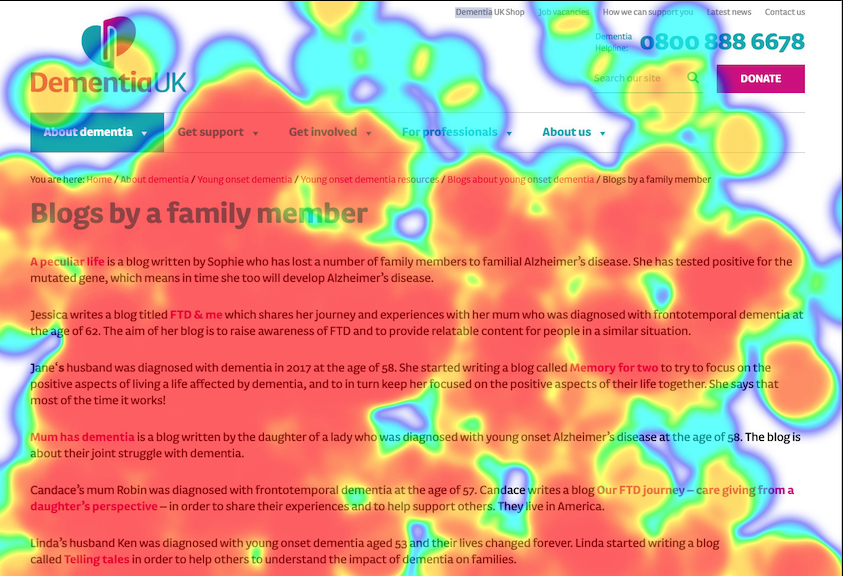
Research Projects
EQUI-Tech Lab: Recent Projects
Investigating the Accessibility and Trustworthiness of Digital Dementia Information via Virtual Eye Tracking
We examine how individuals with mild dementia engage with digital health information, focusing on cognitive load, emotional responses, and trust. Using eye-tracking and facial expression analysis, we assess their interaction with different online dementia information sources, investigating how they process challenging content and their level of trust in these sources.
Analyzing Smartphone Usage with People with Dementia
Mobile phone usage has become ubiquitous in recent decades, including among older adults and those with age-related cognitive changes. The research reveal common interaction patterns, app preferences, and privacy/security measures among these groups, offering insights for developing apps tailored to their needs and suggesting future research directions.
Analyzing Digital Dementia Information in English: Readability and Emotional Characteristics
Our study aimed to comprehensively analyze digital dementia information by exploring its read- ability, linguistic, psychological, and emotional aspects, as well as identifying its intended target audiences. To achieve this, we performed an in-depth textual analysis encompassing three distinct categories of text-based digital dementia information available in English: a dataset consisting of 300 medical articles, 35 websites, and 50 blogs.
Previous Lab and Research Works
Hardware and Security Lab
Security attacks on GPU
As GPUs continue to evolve and gain prominence in various domains, research efforts are increas- ingly dedicated to understanding and countering the development of novel attack techniques, with a particular emphasis on thwarting the exploitation of GPU vulnerabilities by malicious actors.
PhD and Research Projects
PERSIST Lab
Evaluating Performance of Lightweight Cryptographic Algorithms in Battery-less Platform
NIST undertook an evaluation of lightweight cryptographic algorithms using custom-made battery less hardware, aiming to assess their performance against traditional counterparts. This com- prehensive analysis sought to determine the feasibility of replacing traditional security algorithms with lightweight alternatives in batteryless environments, with the ultimate goal of enhancing the user experience within IoT technologies and applications.
All Projects
-
Examines how individuals with mild dementia interact with online dementia information using eye-tracking and Affective computing to assess subjective cognitive load, gaze patterns and fixation patterns.
-
Studies smartphone interaction patterns, app preferences, and behaviors of older adults and people with cognitive changes to enhance user-friendly design.
-
Conducts textual and linguistic analysis of medical articles, websites, and blogs to evaluate readability, tone of the text, emotional impact, and target audience of dementia-related content.
-
Explores potential security vulnerabilities in GPU computing and investigates emerging attack techniques to strengthen hardware security.
-
Assesses lightweight cryptographic algorithms on battery-less IoT hardware to determine their efficiency, security, and feasibility for resource-constrained environments.
-
Developed an Android widget to detect unauthorized data access from other apps, helping users protect their private information like location and emails.
ME. and BE Projects
-
Investigated the role of fog computing in healthcare applications, focusing on real-time data processing, reduced latency, and enhanced security.
-
Designed a Windows-based security application using voice, face, and gesture recognition, demonstrating its feasibility in IoT environments.
-
Created a smart AI assistant for home automation that integrated voice, facial, and gesture recognition using Microsoft Kinect and Arduino.
HATLab
Privacy Issues in Screen Saver Widget-Application
We were developing an Android app and widget to detect data leaks of private information from other apps, such as location, email, name, and phone number. Our goal was to provide users with privacy settings and diverse designs.
Course and other Projects
-
Designed a sensor-equipped car seat with voice assistance to enhance mobility and safety for visually impaired individuals during vehicle travel.
-
Proposed an accessible airport transportation system to improve mobility, usability, and comfort for physically disabled travelers.
-
Investigates how middle-aged individuals interact with security and privacy settings on smartphones, identifying behavioral patterns and comprehension levels.
-
Conducted a qualitative analysis of privacy policies and user trust in COVID-19 testing platforms to assess data security concerns.
-
Explores how international students used technology (social media, apps, and virtual tools) to cope with stress and isolation during the pandemic.
-
Assessed the impact and effectiveness of Voice User Interfaces (VUI) in collaborative environments like classrooms and industries.
-
Analyzed Amazon Alexa reviews to identify potential privacy violations and security risks in third-party voice applications.
-
Developed a chatbot-based testing tool to evaluate security loopholes in Amazon Alexa’s skill approval process, revealing vulnerabilities in its privacy policies.
Industry and Personal Projects
-
Developed an AI-powered interactive learning tool that helps users understand and explore eye-tracking technology and applications.
-
Description text goes here
-
Item description
-
Built a multi-stakeholder educational platform to connect teachers, students, administrators, and parents for seamless communication and learning.


